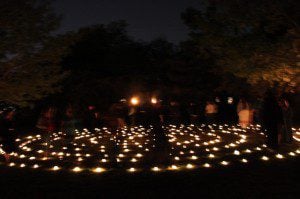The issues of race and racism are being debated vigorously (though not always skillfully) on the Pagan internet. As part of that debate, Morpheus Ravenna has been kicked off PaganSquare because she refused to back down from calling racism what it is. Sam Webster has a good recap of the situation, and Morpheus’ follow-up is on her Shieldmaiden Blog. As I said in my last post on this subject, this is a complicated issue that does not have easy answers.
Today I want to address a small part of this large issue: who can practice a religion that is rooted in the experiences of a specific group of people? And I want to use the answer to that question to suggest an approach to dealing with an uncertain future.
Who Can Practice A Religion?
This is a difficult question for most Westerners, who live in a society where Christian concepts still dominate. Christians want everyone to be part of their religion and joining some Christian denominations is incredibly easy.
This “open to all” idea can also be found in Paganism. For all its English origins and the overwhelming whiteness of its practitioners, Wicca makes no claims to an ethnic heritage. Druidry was revived largely as a celebration of Celtic culture, but as it’s practiced today it’s far more Nature-based than ethnic-based. The Egyptian gods were worshipped in Europe in antiquity and the vast majority of contemporary Egyptians are Muslims who have no connection to them (at least not in public).
This can give those of us who live in this environment the idea that joining any religion is – or should be – just as easy as signing the book at a UU church or entering a dedicant program in a Wiccan coven.
But it’s not always that simple.
For most people in most places throughout most of history, religion wasn’t about what you believed. Religion was – and is – about who you are, whose you are, and how you live your life. If you want to join some religions, it isn’t enough to say “I worship these gods and I participate in these ceremonies.” For some religions, membership is inseparably intertwined with shared culture and shared experiences. If you don’t have those experiences, you can’t fully appreciate the stories and rituals. It is at best naïve and frequently insulting to think someone with no real knowledge of a cultural tradition can walk into an existing group expect to be accepted with open arms.
What prerequisites are legitimate? There are some Pagan groups – not many, but some – who claim that in order to belong, in order to worship their gods and participate in their traditions, you must come from a certain racial bloodline. They say if you don’t have (fairly recent) ancestors who worshipped these gods – and if the color of your skin doesn’t match the predominant skin color of the tradition – then you can’t worship these gods or participate in these traditions. They claim spirituality is somehow tied to DNA, and without the proper genetic similarities, their religion just won’t work for people who don’t look like them.
There simply is no basis for this in biology. Go back far enough and we’re all related. Migration and immigration have mixed bloodlines for millennia – a phenomenon that’s especially true here in the New World. Humans are humans are humans.
There is also no basis for racial exclusion in religion. I’ve met white Hindus, black Druids, brown Wiccans, and just about every other color-religion combination you can imagine. Those who took it seriously and did the work were skilled in their traditions – those who didn’t, weren’t. Beyond that, we have the experience of billions of Christians, Muslims and Buddhists who look nothing like Jesus, Muhammad or Buddha but are knowledgeable and powerful practitioners and leaders in their traditions.
So if anybody can’t be anything but exclusion on the basis of race is at best a mistake and more commonly a display of racism, how do we draw boundaries of membership?
Tribalism – the Good
Russell Erwin sent me a link to this article called “Racism in Asatru” by Wayland Skallagrimsson. It’s a long piece that does a good job of addressing the problems in the Asatru community. Skallagrimsson calls his middle way “tribalism” and explains it like this:
The answer the Tribalists have to the question of “Who can practice Asatru?” is: “Anyone who makes a sufficient effort to understand and adopt the culture of the ancient heathens.” This gives Asatru rigorous enough standards to make sure our practice is like that of the ancients, and is well understood, for to fully adopt another culture requires MUCH study … It also keeps us from the untenable argument that “other races” are somehow so intellectually inferior to the Norse and Germanic that they cannot attain this understanding.
This has been the practice of the Jews for centuries. Judaism accepts converts, but conversion is a long and difficult process designed to insure the convert doesn’t just adopt Jewish beliefs and practices but truly becomes a Jew. The practice has helped maintain Jewish religious and cultural identity in the face of near-constant oppression for 2500 years.
With a tribal approach, religious groups can set their own obligations of membership and anyone who wants to take them on is free to do so. High barriers to membership are a good predictor of retention – they weed out those who aren’t serious or who are unwilling or unable to do the work. If you want to be part of the tribe, then take on the whole tribal culture, not just the parts you find interesting.
Tribalism – the Bad
In this sense, tribalism is a good thing. But tribalism can also be a bad thing. Strong affinity towards one’s tribe can and frequently does lead to suspicion and hostility toward other tribes – particularly when tribes are competing over limited resources. Evolution has equipped us to be binary thinkers, and if “us” is good then “them” must be bad. Perhaps we can all just get along when times are good, but when things get rough, “them” are the first people to get blamed. Read the comments section of any political article and you’ll find conservatives blaming liberals for all our problems and liberals blaming conservatives. Here in Texas any problem that can’t be blamed on Obama is blamed on “illegal immigrants.” In Greece, where the economy is in ruins, the unfortunately-named Golden Dawn is blaming “world Zionism” and offering free food to “Greeks only.”
I’ve long argued we’d all be better off if we’d stop thinking in terms of “us” and “them.” Ultimately humans are one species and we share one planet with all other species – we are related to all other living things. There is enough for all of us and if we focused our attention on making sure everyone has enough instead of on how we can grab as much as we can for ourselves, we’d all be better off.
I still think that’s the ideal situation. The older I get, though, the less convinced I am that humanity is mature enough as a species to ever make it a reality.
Our Need For Strong Tribes
I’m a strong proponent of non-violent conflict resolution. But I’m not a pacifist. Threaten me and mine and I’ll respond as violently as necessary (to date, “as necessary” has been “not very” – I pray that continues). I respect those who are committed to die rather than do violence themselves, but I’m not one of them.
Likewise, while I’d prefer our expressions of tribalism be limited to cultural diversity with no us/them conflict involved, humans have always needed strong tribes to stand against rivals. I do not see this need going away any time soon. For every Bill Gates or Warren Buffett who gives away billions and calls for higher taxes on themselves, there are dozens if not hundreds obsessed with putting every last dollar in their own pockets and insuring it stays within their own tribes. In times of plenty and growth, this isn’t particularly important. But this is not the future we ordered.
As much as I’d like to see a tidal wave of progressive candidates and measures, I’m not counting on it. Call me cynical, but if such a movement began to manifest I suspect the Tribe of the Rich and Powerful would simply co-opt it. Almost two years ago I wrote a series on the Occupy Wall Street movement (the first one is here). In my final post, I recommended two political reforms, but suggested that real change will come only when human hearts and minds change first.
I’m not interested in taking down the Tribe of the Rich and Powerful. I’m interested in making them irrelevant.
We frequently talk about “tribes” when what we really mean are interest groups. But in order to be successful, tribes must create bonds that inspire individuals to put the good of the tribe ahead of their own desires. What can create such bonds in our modern hyper-individualistic society? Football fans display some of the strongest us/them behavior in the world, but it’s hard to see a Packers fan making a serious sacrifice for another cheesehead (I’m sure that happens occasionally, but I’d be shocked if it was a regular occurrence).
 Creating strong bonds at a tribal level requires religion. Not the religion of belief and doctrine, but the religion of myth and ritual, of shared stories and common practices. Religion presents constant opportunities to demonstrate commitment to the tribe, which creates confidence that if I help you now, you’ll help someone later, and someone else will help me when I’m in need. This is particularly true for religions for which hospitality and reciprocity are core values, as they are for many modern Pagan religions.
Creating strong bonds at a tribal level requires religion. Not the religion of belief and doctrine, but the religion of myth and ritual, of shared stories and common practices. Religion presents constant opportunities to demonstrate commitment to the tribe, which creates confidence that if I help you now, you’ll help someone later, and someone else will help me when I’m in need. This is particularly true for religions for which hospitality and reciprocity are core values, as they are for many modern Pagan religions.
Good religion also teaches values that can make the Tribe of the Rich and Powerful irrelevant, to our smaller tribes if not to the general public. Values like the sacredness of the Earth, honoring our ancestors and committing to becoming good ancestors ourselves, honoring the gods and embodying their virtues, and perhaps most importantly, understanding the meaning of “enough.”
Good religion can also keep preaching the interrelatedness of all life and help our tribes focus on taking care of our own instead of on attacking “the other.”
If our weak and slow ancestors hadn’t banded together in tribes, lions and tigers and bears would have wiped them out and we wouldn’t be here. But they did, and so we are. This era of decline will not be easy for any of us, and it will be nearly impossible for those who insist on going it alone. With strong tribes we can not only survive, we can succeed.
















